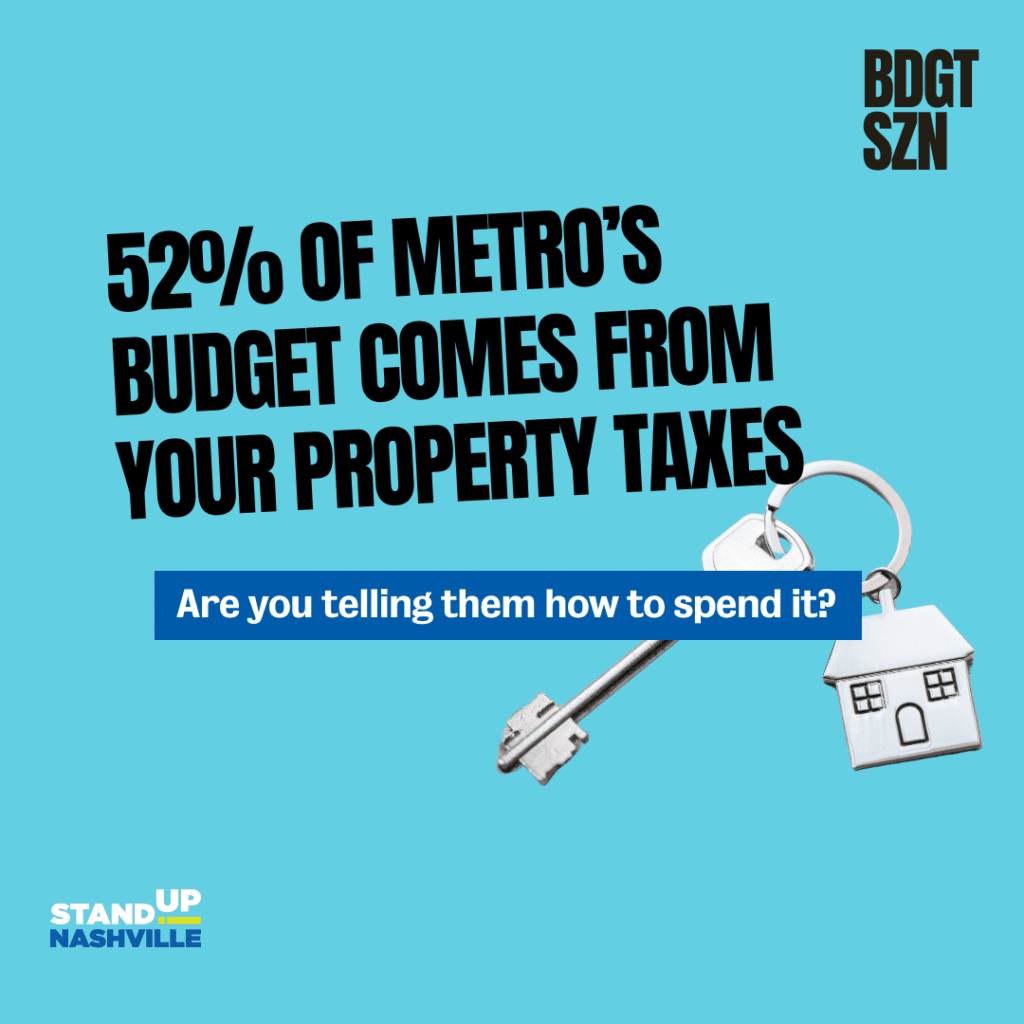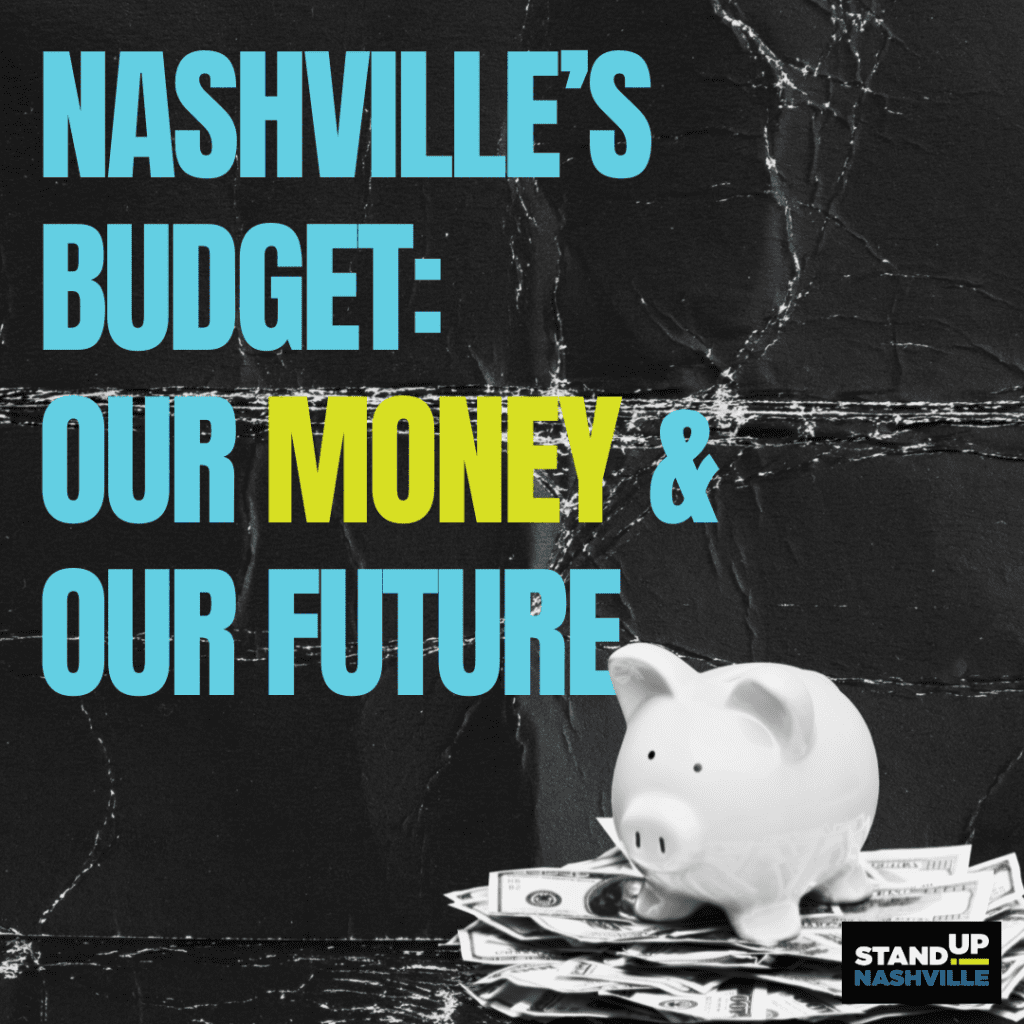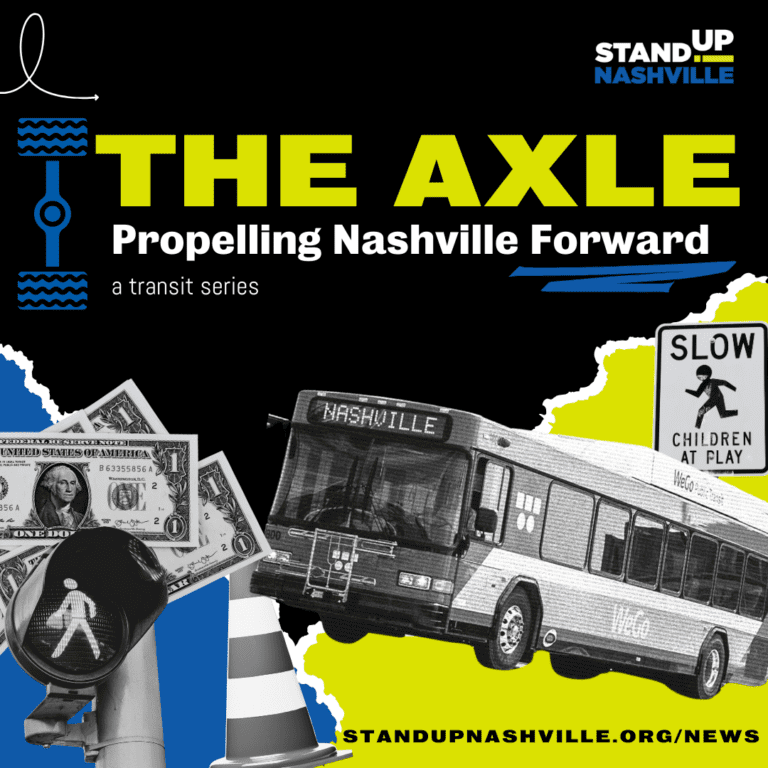Imagine what an extra $1,000 would do for your personal monthly budget. Would you buy different produce or meat options at the grocery store? How about hire a tutor for your child or a laundry service? Maybe begin a minor home repair or pay off a debt? All of these options sound great and would definitely improve your quality of life.
Now what if you were responsible for every person in Metro Nashville, and your budget exceeded the millions mark and became a billion dollar bucket? Whoa! Don’t freak out, you’re not responsible for the city’s budget…but it is $3.22 billion.
That’s the amount designated for education, public safety, infrastructure, and more. On one hand, it seems like a lot of money. However, when we look at the top concerns of everyday Nashville residents, it isn’t enough to meet our needs. Local surveys and our own organizing efforts continue to name housing, transportation, and education as high priorities for the working class, Black people, and communities of color that make Music City worth visiting.


Revenue: How the money flows in
Did you know that funding for the budget is largely derived from property tax and sales tax? What you own and what you buy is used to fund Metro Nashville operations and services.
- Property tax is the largest and most consistent source of revenue. This is paid by homeowners, farm owners, and commercial property owners. In FY 2024, 51.42% of revenue came from property taxes. In FY 2022, property tax made up 56% of all general fund revenue.
- Sales tax is the second largest source of revenue. Currently at 9.25%, this tax appears on receipts of all kinds, including online purchases and groceries. However, only 2.25% of that actually goes to Metro Nashville. The remaining 7% goes to the State of Tennessee. In FY 2024, 22.69% of revenues came from sales tax. Unfortunately, this is a regressive tax because it disproportionately burdens low-income earners.
- Grants and contributions reflect money received from the federal government that is distributed to cities and states. This serves as a critical component of revenue for Metro Nashville and Tennessee. In FY 2024, 14.62% of the budget came from grants and contributions.
- All other revenue is a mix of funds received from fees, fines and penalties, and other governments. In FY 2024, it accounted for 11.3% of the budget.
Expenditures: How the money flows out
The current FY 2024 budget – yes, the $3.22 billion budget has accounted for the following expenses:
- Education at 37.46%
- This includes the money our public schools receive and the amount for educator salaries and wages.
- Public Safety and Justice at 20.37%
- Of this percentage, 11.4% goes to the police.
- General Government at 13.05%
- Debt Service at 12.74%
- The city takes out loans (debt) to cover capital improvement projects. The debt service is the amount the city budgets to repay those loans. It’s just like when homeowners take on a mortgage and then factor mortgage payments into their monthly budget until it is paid off.
- Infrastructure and Transportation at 5.59%
- Yes, you read that right. Not even 6% for road repair, traffic improvements, and public transportation – issues that Imagine Nashville found to be a priority for residents.
- Recreation and Culture at 4.10%
- Public libraries receive 1.2% of this allotment.
- Other at 2.15%
- This accounts for regulation and inspection expenses.

More for this vs. Less for that
Let’s think back to what we would do with more money in our personal budgets. Now consider what more we could do within our city if we had more funds to work with? The reality is that, in order to provide more funding in one area, it has to be taken from another area. That’s what is required by state law in order to have a tax-funded structurally balanced budget, a budget where what’s coming in minus what’s going out equals zero. Plus, the council can only mix and mingle recurring expenditures with recurring expenditures, and non-recurring expenditures with non-recurring expenditures. This limits its flexibility in redirecting funds.
Schools shouldn’t be pit against transportation for necessary funding. Nor should affordable housing be pit against valuable services for families. Teachers need raises and our roads need regular maintenance. Unfortunately, these issues have become unnecessarily polarized and politicized.
We need solutions that incorporate “yes, and.” Therefore, we need to create more sources of revenue. While we’re not experts in that area, we do know that if elected officials stopped handing over massive, decades-long tax breaks to corporations and pet projects like funding a new Titans Stadium – we’d have more revenue for fully funding our public schools, enhancing infrastructure, and setting money aside for affordable housing.
This matters because each of us desires a city where we can live, work, and play, regardless of socioeconomic status. Just like the budget is essential for your home, it is also essential for Metro Nashville residents. Even if they don’t even know it yet.
Types of funding: Dedicated vs. Appropriated
We previously mentioned budget expenditures being recurring and non-recurring. The annual budget only determines how to appropriate tax revenue for one-time use during the upcoming fiscal year. This means public services provided to Nashvillians do not have dedicated, recurring funding; instead, they must be considered and funded annually through appropriation. When public services and high-impact issues are not provided with dedicated, recurring funding, it sends a message that they are not important. Take housing for example: the Barnes Housing Trust Fund provides non-profit developers with funding to build affordable housing. This funding could lead to 1,500 units automatically being built annually, instead of relying on an annual approval from council.
As you can see, the budget is vital. But it isn’t impossible to improve.
Ready to get active with SUN? Click here to attend our events and volunteer.







